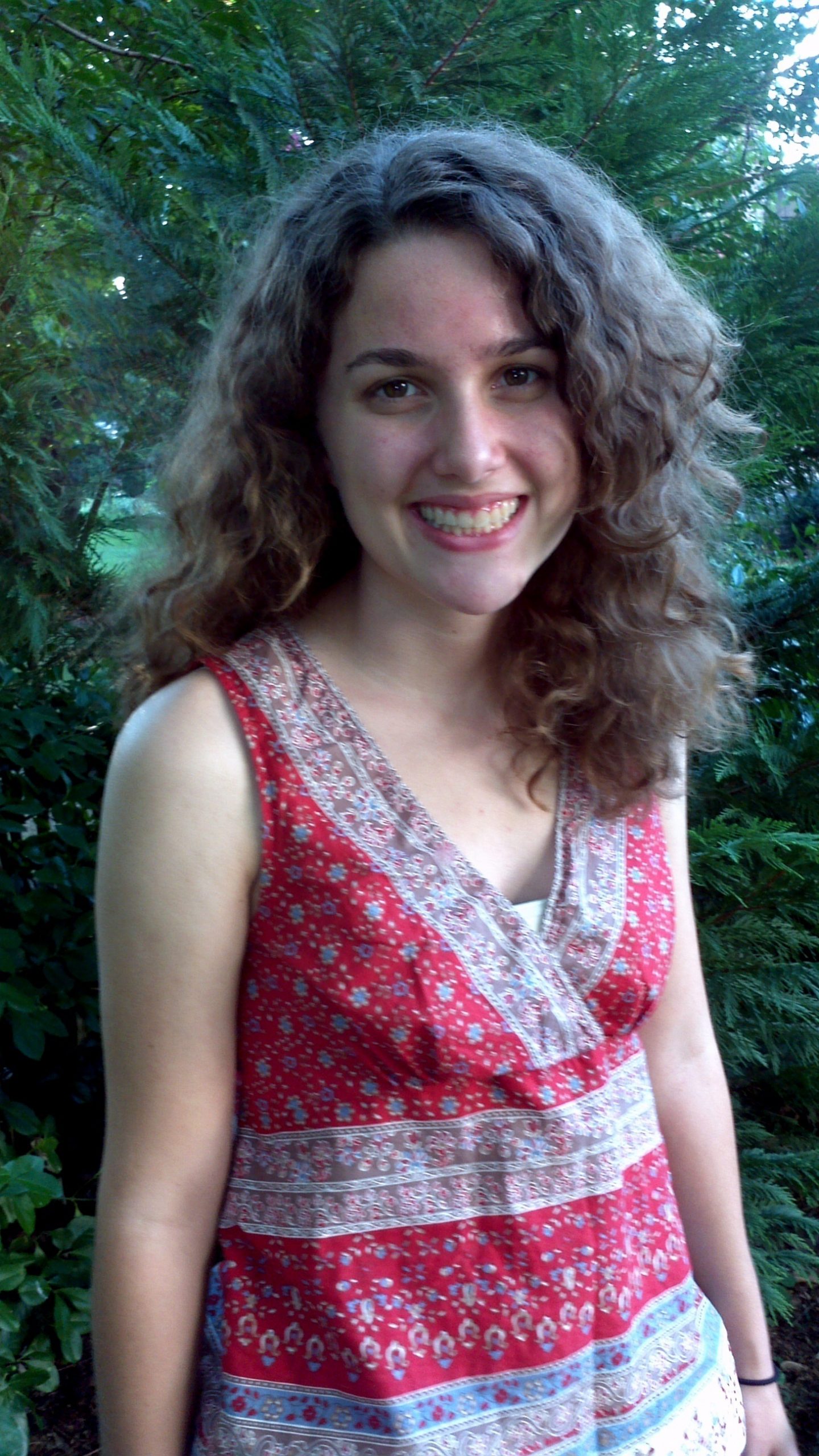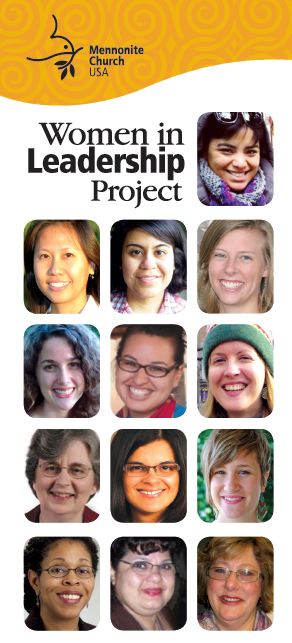Subgroups focusing on mentoring, monologues, empowering resources, undoing sexism
[Español]
ELKHART, Indiana (Mennonite Church USA)—Mennonite Church USA’s Women in Leadership Project (WLP), whose goal is to address the systemic obstacles that stand in the way of women becoming church leaders, continues to generate interest and gather support from across the country.

Emily Kraybill of Goshen (Ind.) College served the Women in Leadership Project as a Ministry Inquiry Program intern in the summer of 2012.
“We are blessed to be joined by many who are committed to volunteering their time in order to move this work forward,” says Joanna Shenk, who coordinates the project with Hilary Scarsella. Shenk and Scarsella are Mennonite Church USA Executive Board staff members.
In addition to coordinating four focus groups—one each on mentoring, monologues, empowering resources, and undoing sexism—WLP staff members are leading several other initiatives, from a Women in Leadership blog on Mennonite Church USA’s website to a “Women Doing Theology” conference slated for early 2014. There are plans to create an online tool that will help interested congregations and church agencies locate people in their areas who can provide education and services to address domestic violence and abuse.
At the churchwide convention to be held July 1–6 in Phoenix, the WLP will host a learning experience, Undoing Sexism through Storytelling, and a seminar, Circles of Solidarity: Creating Mentoring Networks for Women. An exhibit highlighting 100 years of Mennonite women’s history in the United States—compiled by Goshen College intern April Zehr—also will be on display.
“The Women in Leadership Project provides an opportunity for the church to get a more complete and honest contribution from our past, present and future women leaders,” says Moniqua Acosta of New Holland (Pa.) Spanish Mennonite Church—Jesucristo Es El Señor, a WLP steering committee member. Acosta serves as program and member services manager for Mennonite Health Services (MHS) Alliance. “It provides insight and education to church leaders on how to interact with, teach and support their entire congregation.”
The WLP began in August 2009. During the project’s first two years, Shenk conducted an audit of Mennonite organizations related to numbers of women in leadership, worked with a short-term steering committee, presented findings of the audit to the denomination’s Executive Board and Constituency Leaders Council, hosted a gathering of 30 women leaders in Goshen, Ind., and led a workshop with Scarsella at a Mennonite Women USA “Women in Conversation” retreat in Hesston, Kan. She also coordinated a seminar and reception in July 2011 at the denominational convention in Pittsburgh.
“The conversation at Pittsburgh 2011 resonated with feedback from other gatherings that had happened across the country,” she says.
In the months that followed, additional gatherings were held in Greeley, Colo., and Newton, Kan. The needs and goals identified at all of these gatherings were shaped into the four focus groups described below. A new steering committee was formed in August 2012 to provide vision for and feedback on each part of the project.
“Recognizing that no one form of oppression exists on its own, this steering committee is tasked with holding the Women in Leadership Project accountable to an approach that understands that the need for undoing sexism intersects with needs for undoing racism and all other ‘isms,’” Scarsella says.
WLP steering committee members include Moniqua Acosta of Lancaster, Pa.; Erica Littlewolf of Albuquerque, N.M.; Aveani Moeljono of Azusa, Calif.; Linda Gehman Peachey of Lancaster; Sandra Pérez of New York City; and Regina Shands Stoltzfus of Goshen, Ind.
Focus groups
The Mentoring focus group is working to create a network of support and development for women leaders across the church, focusing specifically on theological leadership, pastoral leadership, institutional leadership and conference leadership.
“We recognize the importance of mentors in our own lives and also our longings to have mentors, especially other women,” says Janeen Bertsche Johnson, a member of the group. “One of our goals is to help the church be more intentional in fostering mentoring relationships that develop women’s leadership gifts and skills.”
The Monologues focus group strives to create a safe space for women to tell their stories of struggle and hope related to being in leadership in the Mennonite Church. The group is launching a website where women’s stories will be collected and shared for one year; the group will then select some of the stories to appear in a book.
“I believe that the Mennonite Monologues will give voice to women’s stories that have never had a public space to be shared,” says Rachel Halder, a member of the group. “Only through the sharing of stories will we see considerable change in attitudes, perceptions and leadership in the church.”
The Empowering Resources focus group is developing a worship series intended to help not only women and girls but also entire congregations address the need for undoing sexism in both personal and congregational settings. The worship resources will take into account women’s stories and experiences in the Bible and today.
“We believe that worship with this emphasis offers the whole church an opportunity to experience God more fully and deeply,” Scarsella notes. “It forms women and girls to believe that they are worthy of being called as leaders.”
The Undoing Sexism focus group is tasked with generating conversation about naming and transforming systemic sexism in Mennonite Church USA. With careful attention to the broad range of needs across the denomination regarding this subject, this group is creating a document that seeks to explain the need for attention to be given to systemic sexism in the life of the church. The group is also working toward creating a website to offer resources to support Mennonite secondary education teachers of all subjects in providing anti-sexist and anti-racist education.
Erica Littlewolf, a WLP steering committee member from Albuquerque, N.M., reflects on her experience with the WLP: “It’s exciting to have an intentional space for women from all dimensions of life to meet together for a common purpose, with an underlying commitment to and grounding in Mennonite Church USA … all expressed differently and openly. By its existence, the project shows a new way of being and brings questions that are options for discussion and relationship.”
For more information about the findings of Mennonite Church USA’s Women in Leadership Audit conducted in 2009–10, see “Survey: more women in leadership but still not enough,” a news analysis by Joanna Shenk in the March 2010 issue of The Mennonite.
See also the website of the Women in Leadership Project.
###
—Mennonite Church USA staff
Sidebar:
Further history of the Women in Leadership Project
In March 2009, leaders at a Mennonite Women USA strategic planning retreat observed that there were fewer women in leadership in some parts of Mennonite Church USA than there had been in previous years. In August of that year, denominational staff asked Joanna Shenk to conduct a “Women in Leadership Audit” of Mennonite Church USA.
For the audit, Shenk contacted all of the Mennonite Church USA agencies as well as organizations such as Mennonite Central Committee and Mennonite Economic Development Associates, asking for records of women in leadership positions since the early 1980s. Specifically, she sought the numbers of women on boards of directors as well as in organizational and congregational leadership roles as executive directors, presidents and vice presidents, lead pastors, moderators and board chairs.
The audit found that while there had been increases in the number of women in full-time ministry and on many of the boards of directors, there had not been a similar increase in numbers of women in organizational leadership positions of directors and presidents.
After Shenk’s initial findings were presented to Mennonite Church USA’s Executive Board and Constituency Leaders Council (CLC), a short-term steering committee of eight women was formed in October 2009 to continue research into the audit data; to pursue the question, “Why do women say no [to church leadership positions]?”; and to prepare a report with recommendations for the denomination.
“After receiving feedback from women who had recently declined leadership positions, the steering committee discerned that the problem was systemic,” says Hilary Scarsella, who served on the committee. “Attention to the need for undoing sexism in church leadership structures was deemed necessary in order to reverse the trend.”
In March 2010, the committee’s findings and recommendations for next steps were presented to the CLC and also affirmed by the board of Mennonite Women USA.
###
Images available:
ftp://ftp.e.mennonites.org/public/NewsPhotos/EmilyKraybill_WomenInLdrshp_MIPintern.jpg
Emily Kraybill of Goshen (Ind.) College served the Women in Leadership Project as a Ministry Inquiry Program intern in the summer of 2012. (Photo by Joanna Shenk)
ftp://ftp.e.mennonites.org/public/NewsPhotos/WomenInLeadership_brochure_cover.jpg
Cover of the new Women in Leadership Project brochure.


